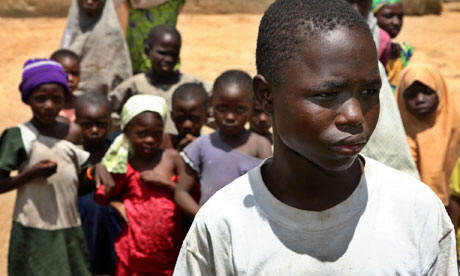The world's biggest research-based pharmaceutical company announced on Thursday that it had made payments of $175,000 (£108,000) to each family. More such compensation settlements are expected to follow.
Pfizer was sued after 11 children died in a clinical trial when the northern state of Kano was hit by Africa's worst ever meningitis epidemic in 1996. A hundred children were given an experimental oral antibiotic called Trovan, while a further hundred received ceftriaxone, the "gold-standard" treatment of modern medicine.
Five children died on Trovan and six on ceftriaxone. But later it was claimed that Pfizer did not have proper consent from parents to use an experimental drug on their children and questions were raised over the documentation of the trial.
Legal action filed against the company alleged that some received a dose lower than recommended, leaving many children with brain damage, paralysis or slurred speech.
US-based Pfizer had argued that meningitis and not its antibiotic had led to the deaths of 11 children and harm to dozens of others. But in 2009 it reached a tentative out-of-court settlement with the Kano state government worth $75m.
The families of four of the children each collected cheques for $175,000 from a compensation trust fund, after submitting DNA samples to show that the dead were their offspring.
The compensation was the first given out by the Healthcare/Meningitis Trust Fund. The decision over who is compensated and for how much is being managed by an independent board of trustees in Kano, not by the government or Pfizer, the company has said. "We are pleased that these four individuals, the first group of qualified claimants of the Healthcare/Meningitis Trust Fund, have received compensation," said a spokesman.
"This is the first step in a multiphase review process by which the independent board of trustees that manages the funds will deliver payments to all other claimants.
"We thank them for their commitment and dedication to seeing this process through in the most timely and transparent way possible."
But one parent who lost a daughter said the process was still dogged by local factionalism and he had no idea when he would receive money.
"I talked to my attorney this week," said the man, who did not wish to be named for legal reasons. "They are still in contact with Pfizer as to when I will get paid. We are just crossing our fingers."
He added: "We are fed up with this case. Our children are dead and some are maimed. We want to end this matter now, but some people are being opportunist for riches."
Pfizer said in February it had settled all outstanding lawsuits involving accusations that it tested the experimental antibiotic Trovan on children.
The pharmaceutical giant also agreed to sponsor health projects in Kano as well as creating a fund of $35m to compensate those affected.
But last year a US diplomatic cable uncovered by WikiLeaks revealed that Pfizer hired investigators to look for evidence of corruption against the Nigerian attorney general in an effort to persuade him to drop the legal action.
The cable reported a meeting between Pfizer's country manager, Enrico Liggeri, and US officials at the Abuja embassy on 9 April 2009. It stated: "According to Liggeri, Pfizer had hired investigators to uncover corruption links to federal attorney general Michael Aondoakaa to expose him and put pressure on him to drop the federal cases.
He said Pfizer's investigators were passing this information to local media."
There is no suggestion that the attorney general was swayed by the pressure.
Pfizer had planned to sell Trovan in the US and Europe after the trials on African children. However, its licence was withdrawn in Europe because of concern over liver toxicity.
